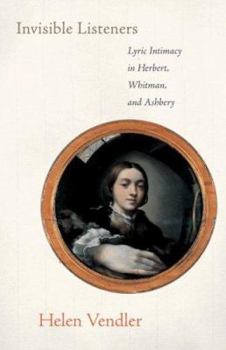Invisible Listeners: Lyric Intimacy in Herbert, Whitman, and Ashbery
Select Format
Select Condition 
Book Overview
When a poet addresses a living person--whether friend or enemy, lover or sister--we recognize the expression of intimacy. But what impels poets to leap across time and space to speak to invisible listeners, seeking an ideal intimacy--George Herbert with God, Walt Whitman with a reader in the future, John Ashbery with the Renaissance painter Francesco Parmigianino? In Invisible Listeners, Helen Vendler argues that such poets must invent the language that will enact, on the page, an intimacy they lack in life.
Through brilliantly insightful and gracefully written readings of these three great poets over three different centuries, Vendler maps out their relationships with their chosen listeners. For his part, Herbert revises the usual "vertical" address to God in favor of a "horizontal" one-addressing God as a friend. Whitman hovers in a sometimes erotic, sometimes quasi-religious language in conceiving the democratic camerado, who will, following Whitman's example, find his true self. And yet the camerado will be replaced, in Whitman's verse, by the ultimate invisible listener, Death. Ashbery, seeking a fellow artist who believes that art always distorts what it represents, finds he must travel to the remote past. In tones both tender and skeptical he addresses Parmigianino, whose extraordinary self-portrait in a convex mirror furnishes the poet with both a theory and a precedent for his own inventions. By creating the forms and speech of ideal intimacy, these poets set forth the possibility of a more complete and satisfactory human interchange--an ethics of relation that is uncoerced, understanding, and free.Format:Paperback
Language:English
ISBN:069113474X
ISBN13:9780691134741
Release Date:September 2007
Publisher:Princeton University Press
Length:112 Pages
Weight:0.35 lbs.
Dimensions:0.3" x 6.4" x 8.3"
Customer Reviews
0 rating





